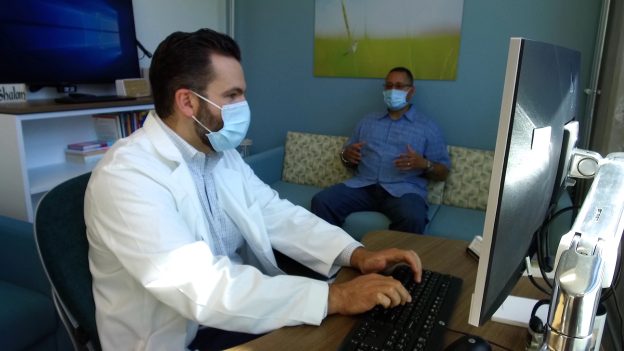
Risk of blood clots more than 3-fold higher in hospitalized adults with COVID-19
Hospitalized adults who have COVID-19 are more than 3 times as likely to develop a blood clot than adults who do not have COVID-19, according to new research from Kaiser Permanente Southern California and Kaiser Permanente Northern California.
The study published July 20 in CHEST found Black patients as well as patients who had obesity, liver disease, or sepsis or other signs of infection were among those more likely to be at high risk for a blood clot. This is believed to be the first U.S. study to directly compare blood clot risk in an ethnically diverse group of matched hospitalized adults with and without COVID-19.
“Our study highlights the risk of venous thromboembolism, or blood clots, linked to COVID-19 in hospitalized adults, and it provides more definitive evidence about which patients are at particularly high risk,” said the study’s lead author Alan S. Go, MD, a senior research scientist at the Kaiser Permanente Northern California Division of Research
The retrospective study compared 6,319 adults who had COVID-19 with 6,319 similar adults who did not have COVID-19 who were hospitalized between February and August 2020 in Kaiser Permanente Northern California or Kaiser Permanente Southern California. The adults had a mean age of 60; 46% were women, 53.1% were Hispanic, 14.6 % were Asian/Pacific Islander and 10.3% were Black.
Each adult with COVID-19 was matched to an adult without COVID-19 who was of the same age, gender, race or ethnicity, illness severity, and month of hospitalization. “This study is unique because we were able to examine the risk of blood clots in similar people who did not have COVID-19, making us more confident this was an ‘apples to apples’ comparison and sure of our conclusions,” said the study’s senior author Margaret C. Fang, MD, MPH, a professor of medicine at the University of California, San Francisco.
During 30 days of follow-up, 313 adults in the study experienced a blood clot. After considering other potential illnesses and health problems that increase risk of blood clots, along with the risk of dying from other causes, the researchers found the risk of developing a blood clot was nearly 3.5 times higher in the patients with COVID-19. Within this group of patients, the study showed the risk was nearly 2 times higher in Black adults; more than 3 times higher in those age 75 and older; and nearly 6 times higher in those with moderate to severe liver disease.
“Our study findings reveal the critical need for additional randomized trials to find more effective strategies to prevent and treat these types of blood clots and to determine which COVID-19 patients benefit most from which strategy,” said Dr. Go.
Researchers are trying to determine why COVID-19 increases the risk of blood clots. “While the exact mechanism for why COVID-19 increases the risk of blood clots is not fully known, COVID-19 infection could activate multiple inflammatory and coagulation responses,” said co-author Kristi Reynolds, PhD, a senior research scientist at Kaiser Permanente Southern California Department of Research & Evaluation.
The study was supported by a research funding award from the Patient-Centered Outcomes Research Institute.
Co-authors include Grace H. Tabada, MPH, Sue Hee Sung, MPH, Elisha Garcia, and Dongjie Fan, MSPH of the Division of Research; Priya A. Prasad, PhD, MPH, of the University of California, San Francisco; Cecilia Portugal, MPH, of the Department of Research & Evaluation; and Ashok P. Pai, MD, of The Permanente Medical Group.





